



























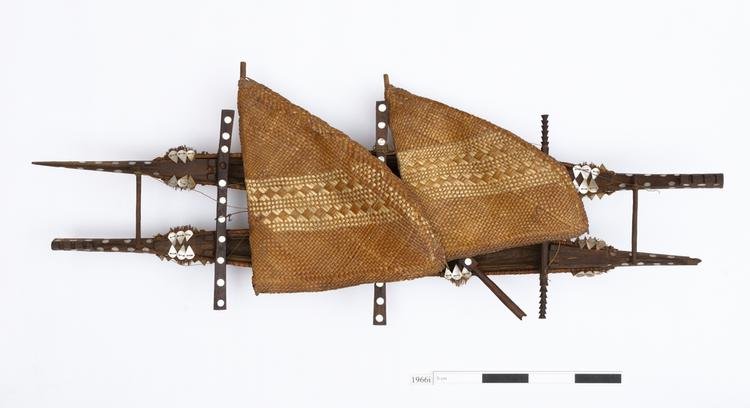

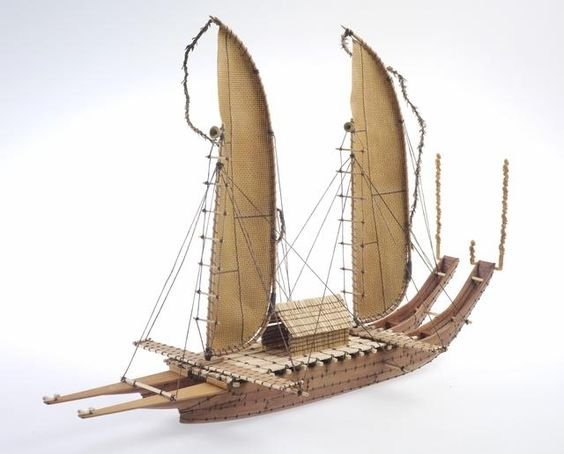









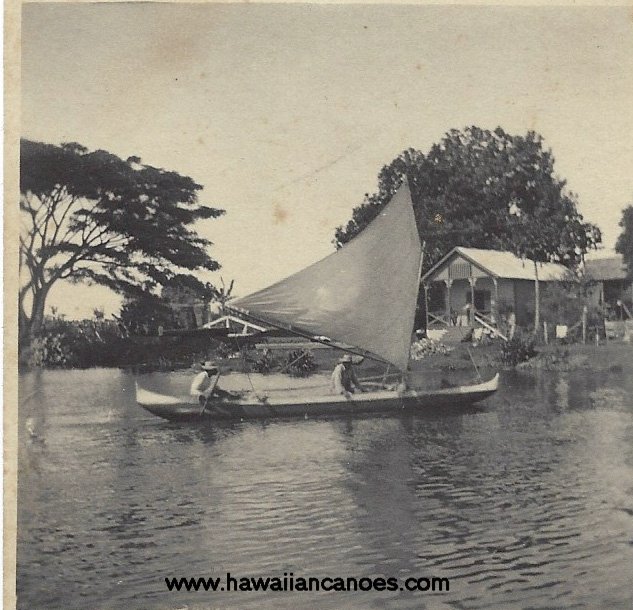












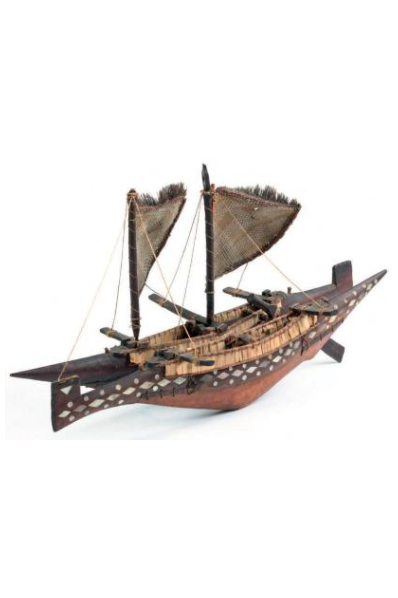
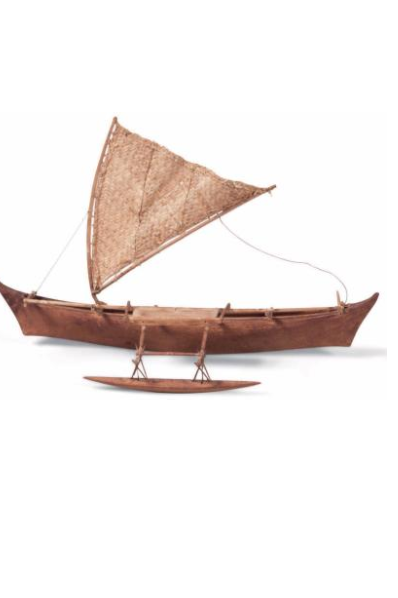








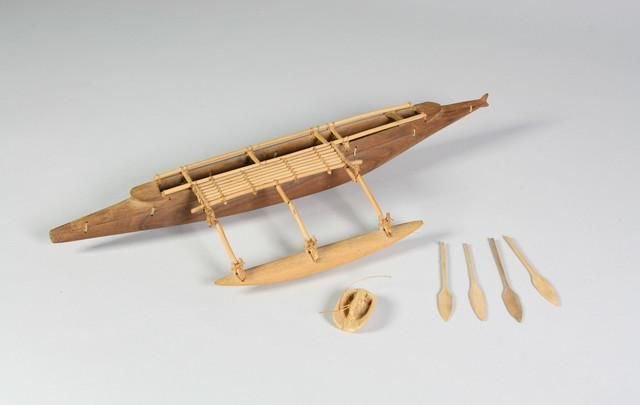


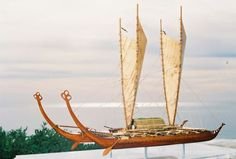


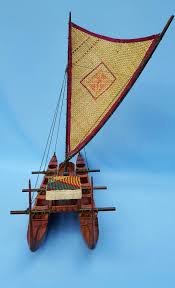


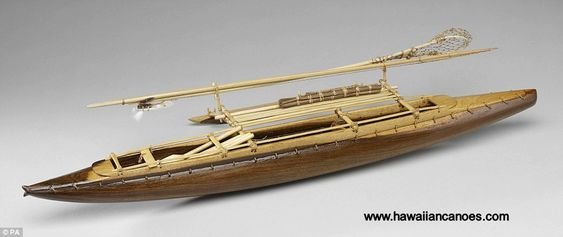


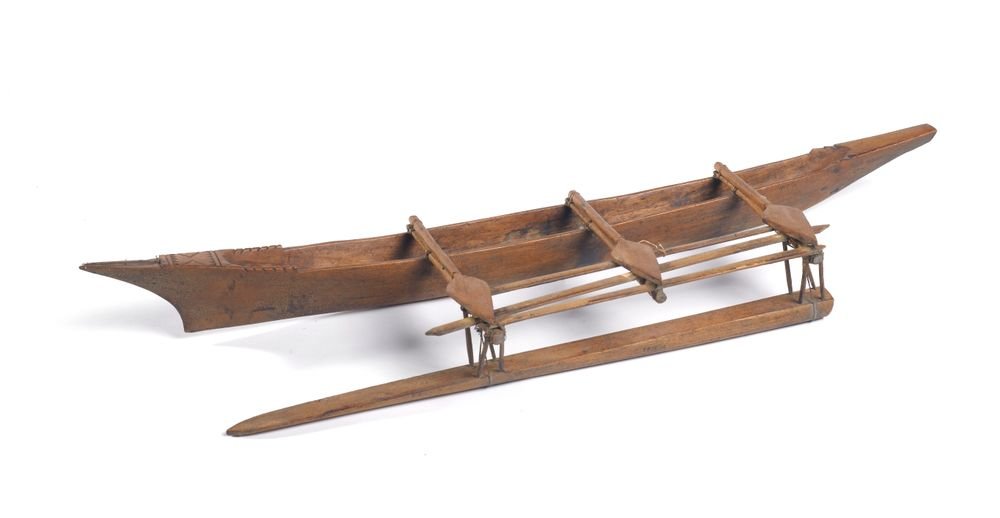







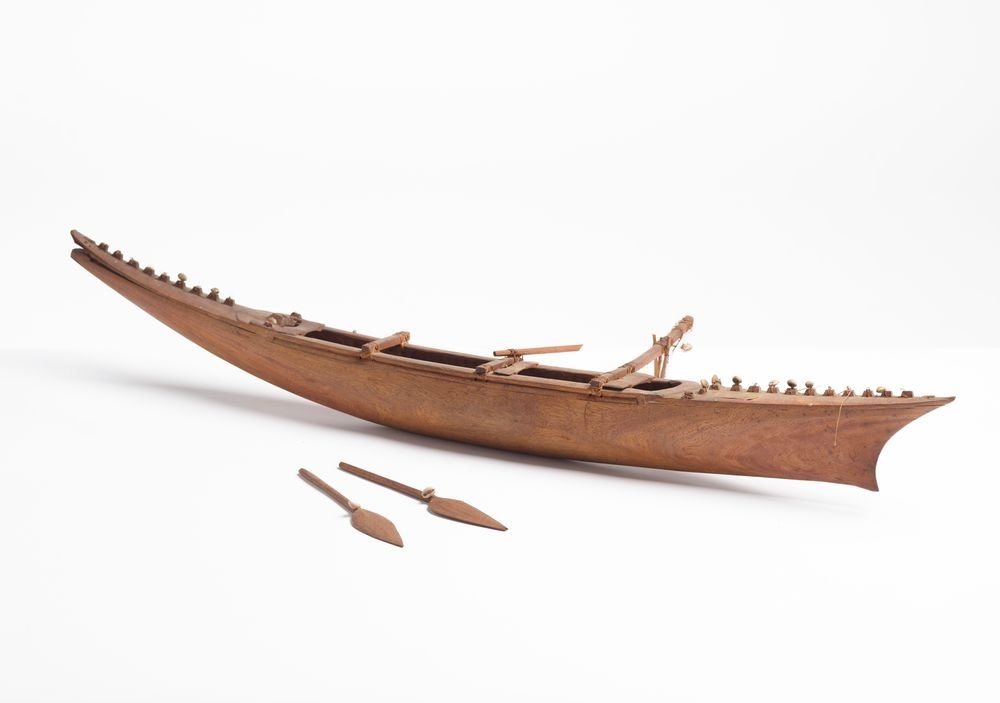
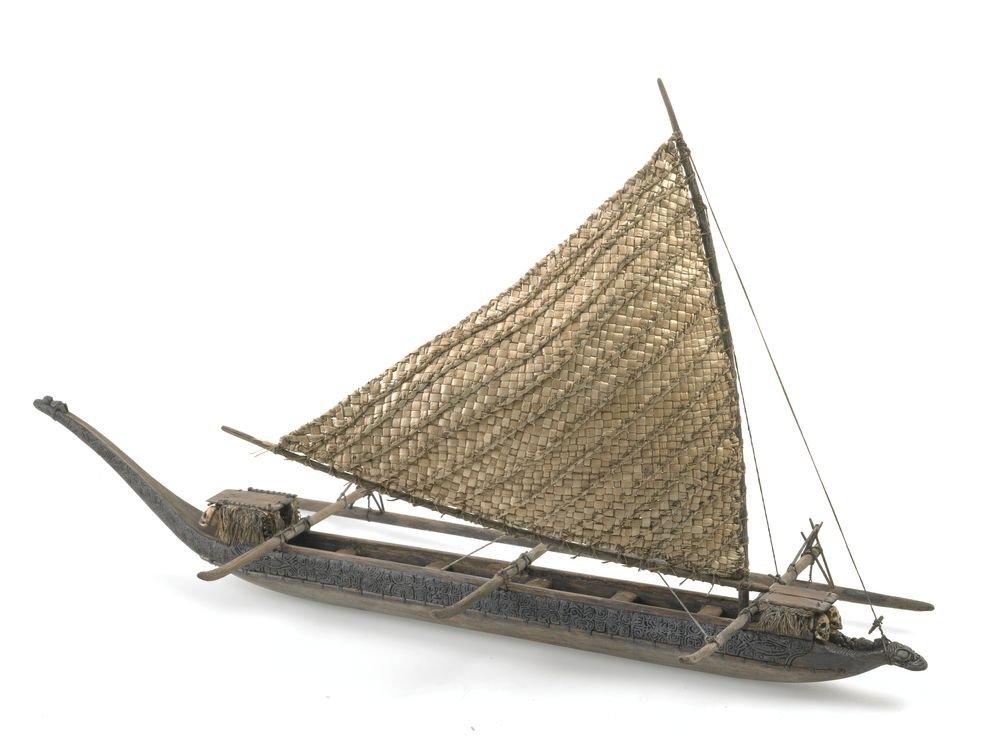





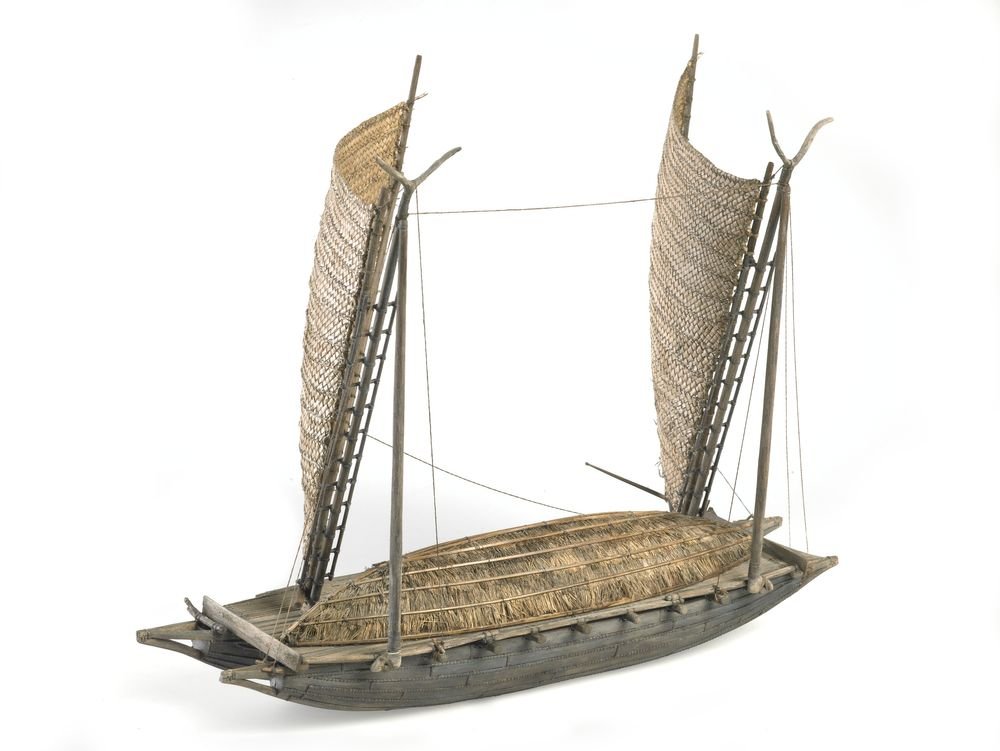


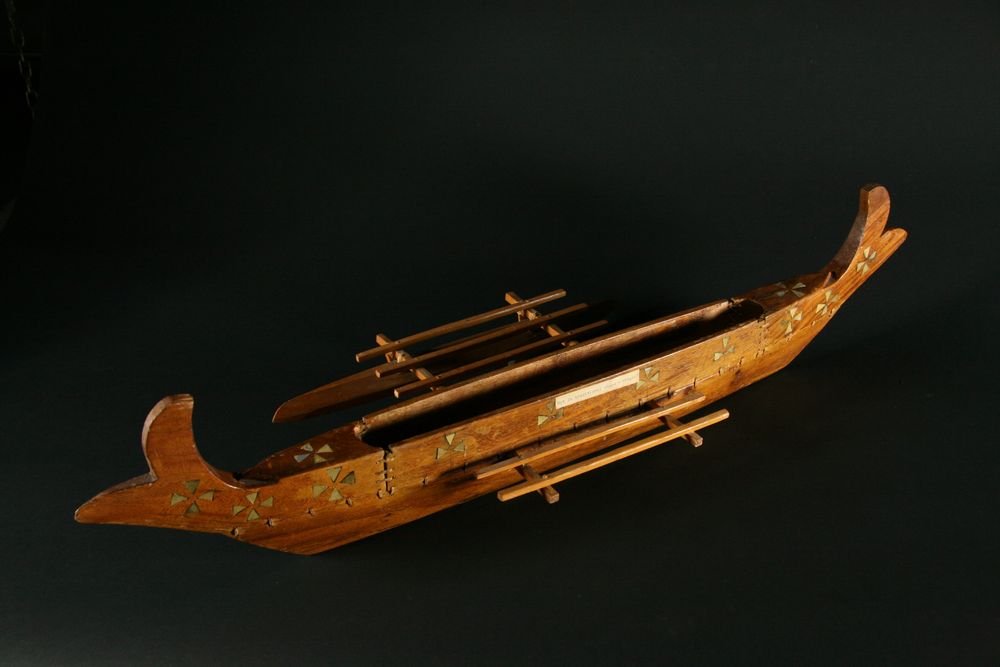

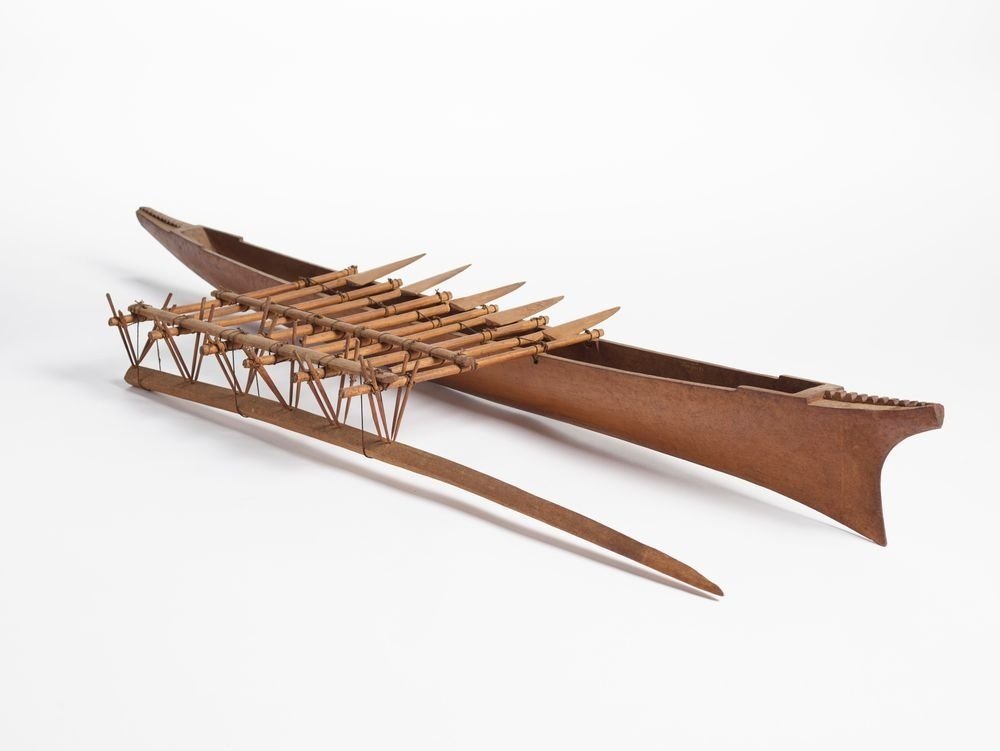



















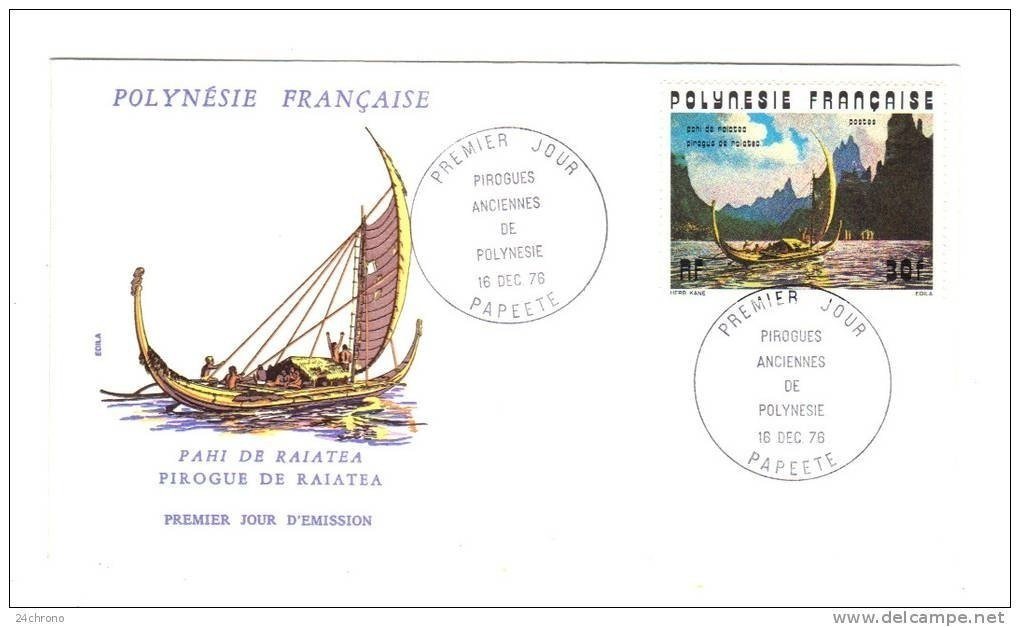
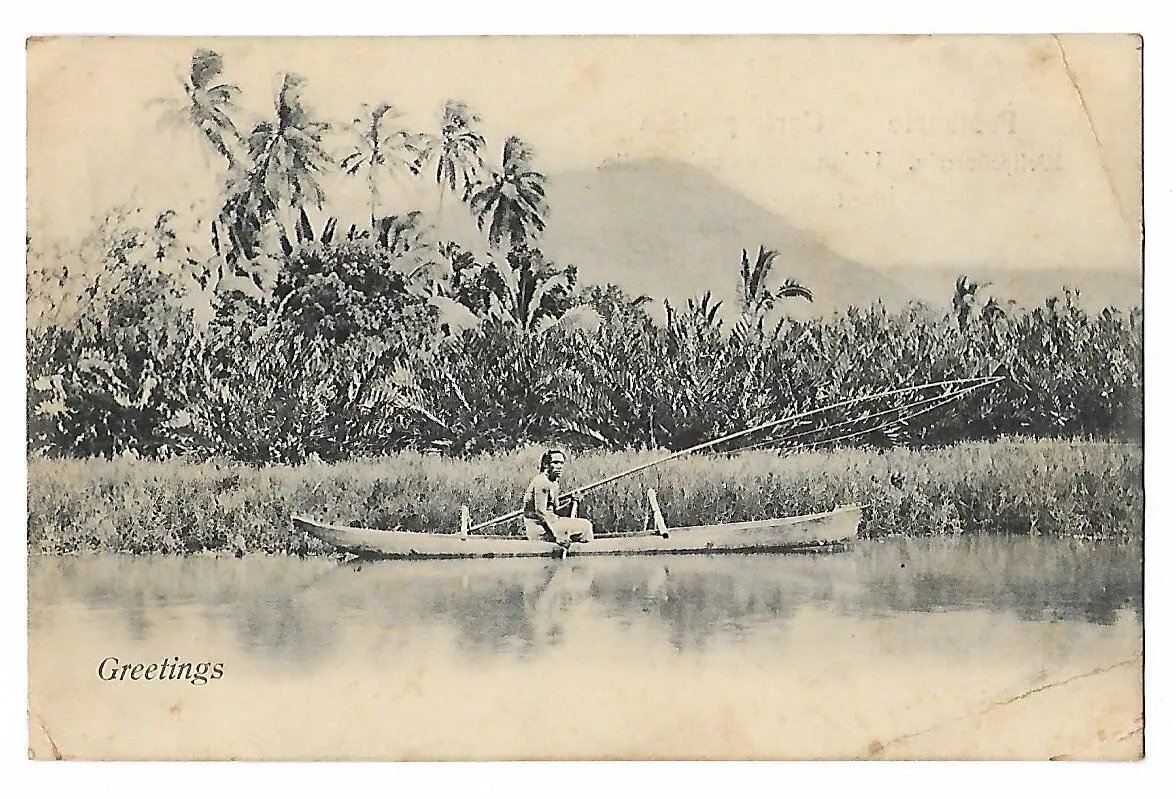


































































































https://en.wikipedia.org/wiki/Polynesian_Triangle
Polynesia is a subregion of Oceania, made up of more than 1,000 islands scattered over the central and southern Pacific Ocean. The indigenous people who inhabit the islands of Polynesia are called Polynesians. They have many things in common, including linguistic relations, cultural practices, and traditional beliefs. In centuries past, they had a strong shared tradition of sailing and using stars to navigate.
Throughout Polynesia and Oceania in general, canoes have been, and in some cases still are, a primary means of transportation between islands. They also serve as an essential method for fishing along the shores. Some canoes were specifically designed to accommodate a large number of warriors for the purpose of waging war and conquering other islands. The size and construction of canoes were greatly influenced by the materials available on each particular island. For example, Hawaii was able to build large voyaging or war canoes using the renowned Koa tree. Meanwhile, the Māori in New Zealand constructed war canoes, known as "Waka Taua," that could be up to 130 feet long, utilizing the massive Kauri or Totara trees. While most canoes, regardless of size, were dugouts, some, particularly in Samoa , were built using plank construction.
Over the last 30 years, I have collected thousands of pictures of Polynesian canoes, including full-size examples, models, and representations in prints and paintings, both ancient and contemporary. It will be a labor of love to catalog the majority of these images. However, I plan to share the most interesting ones gradually and organize them by island at a later stage.
https://en.wikipedia.org/wiki/Polynesian_Triangle
Polynesia is a subregion of Oceania, made up of more than 1,000 islands scattered over the central and southern Pacific Ocean. The indigenous people who inhabit the islands of Polynesia are called Polynesians. They have many things in common, including linguistic relations, cultural practices, and traditional beliefs. In centuries past, they had a strong shared tradition of sailing and using stars to navigate.
Throughout Polynesia and Oceania in general, canoes have been, and in some cases still are, a primary means of transportation between islands. They also serve as an essential method for fishing along the shores. Some canoes were specifically designed to accommodate a large number of warriors for the purpose of waging war and conquering other islands. The size and construction of canoes were greatly influenced by the materials available on each particular island. For example, Hawaii was able to build large voyaging or war canoes using the renowned Koa tree. Meanwhile, the Māori in New Zealand constructed war canoes, known as "Waka Taua," that could be up to 130 feet long, utilizing the massive Kauri or Totara trees. While most canoes, regardless of size, were dugouts, some, particularly in Samoa , were built using plank construction.
Over the last 30 years, I have collected thousands of pictures of Polynesian canoes, including full-size examples, models, and representations in prints and paintings, both ancient and contemporary. It will be a labor of love to catalog the majority of these images. However, I plan to share the most interesting ones gradually and organize them by island at a later stage.
Hawaiian canoe
A beautiful model canoe
Hawaiian Canoes
This is an early 20th-century photograph. Notice that the hulls of the canoes are darker than the tops. This difference in color may be due to the hulls being carved from Koa wood, while the gunnels and tops are made from a lighter-colored wood, such as Ahakea.
Hawaiian canoe
A photo dating back to the beginning of the 20th century showing a native paddling along the shore.
Hawaiian outrigger
Another picture issued as a post card towards 1915 showing a canoe fitted with a sprit sail.
The location seems to be near the Hawaiian Outrigger canoe club.
Hawaiian canoe
Small Hawaiian canoe model
Hawaiian Canoe 1915
A picture daring back towards 1915 showing a Hawaiian outrigger canoe fitted with a sprit sail. The Royal Hawaiian Hotel in the distance
Hawaiian fishing canoe
An early 20th century colored postcard showing a Hawaiian using a fishing pole.
Hawaiian canoes
1880's Hawaiians in outrigger canoes Waipi'o Valley, Maui
Hawaiian canoes
1880's Hawaiians in Outrigger Boats Waipi'o Valley Maui
Hawaiian canoes
1880's Hawaiians in Outrigger Boats Waipi'o Valley Maui.
Samoan canoe
Nice little model
Marquesan canoe model
MARQUESAN CANOE hull ornamented with incised patterns as shown in this model. The fore end piece is often carved with a human face whereby the end piece is bearing a recumbent tiki figure.
MANIHIKI , Cook Islands
This particular model of a Manihiki canoe from the Cook Islands is at the Horniman Museum, London. I know of 3 more more models, one at the Scottish Royal Museum, one at the Peabody Museum, Salem and the third at Te Papa Colletions,, NZ.
Hawaiian canoe
This model of an outrigger canoe, fitted with a European sprit sail, resembles closely that of Hawaiian fishing canoe, but at closer inspection it looks to be from Bonin Islands.
SAMOAN BONITO CANOE
I have always regarded this canoe, with its elegant lines, as one of the most beautiful Polynesian fishing canoes. It is not a dugout; it is entirely built from planks. This picture was taken in 1914.
Over the last six years, I have created two large-scale models of this vessel.
Samoan canoe
This is a model of a Samoan canoe of the type “Soatau” I made many years ago. Notice the curved figurhead on which cowry shells were tied.
Cook Islands canoe
This is a small double-hull canoe from the island of Atiu. The small canoes of the Cook Islands share many similarities with Hawaiian fishing canoes, particularly in their shapes, which feature a raised stern and a lower bow piece, known as the manu, at the front. Most notably, the Cook Islanders used wood from the breadfruit tree to construct their canoes.
Samoan double hull canoe
A Samoan double hull voyaging canoe of the type “Alia”. It is the Samoan version of the Fiji Ndrua.
Samoan bonito canoe
Several years ago, I created a wonderful scale model of the Samoan bonito canoe, entirely plank-built and crafted from Koa wood. This model is now displayed in the lobby of the Four Seasons Hotel Resort at Manale Bay, Lana'i, Hawaii.
New-Zealand
This is a “waka tete”, a Maori fishing canoe . The figurehead at the bow of the canoe is a rudely carved representation of a human face sticking out the tongue. The representation of a human body is sitting at the stern of the canoe.
Tuvalu fishing canoe
This is a model canoe replicating a Tuvalu canoe. of the type “Paopao”. Tuvalu, formerly Ellice Islands.`
SAMOAN CANOE
A Samoan canoe model in the Vatican Museums. The canoe has the shape of an “amatasi” type, whereby an amatasi is equipped with only 7 beams and not 8.
1880 NEW-ZEALAND WAR CANOE
A picture dated 1880 showing a Maori war canoe of the type “Waka Pitau”.
NEW-ZEALAND WAR CANOE
Canoe model.
TOKELAU
Small fishing canoe model of the type “Paopao”
NEW-ZEALAND WAR CANOE
Showing the ornamental carved stern of the canoe or “Tau-rapa”
NEW-ZEALAND WAR CANOE
Showing the ornamental bow of the canoe or “ Tau-ihu”
Cook Islands
Canoe in Rarotonga, Cook Islands. It has a front top very similar to those in Hawaii. Note the carvings along the hull.
Cook island canoe
Top view of the “Manihiki” canoe model at the Horniman Museum, London
Cook island canoe
Side view of the “Manihiki” canoe model
Tahiti
Tipairua voyaging canoe
Cook Island
Front view of the Manihiki canoe model at the Horniman Museum, London.
Hawaiian canoe with sprit sail.
This is an early post card showing a canoe near the Outrigger Club.
Maori war canoe
New-Zealand
Hawaiian outrigger canoe
Hawaiian double hull
Hawaiian double hull sailing canoe
Hawaiian double hull
Hawaiian double-hull canoe with crab claw sail
Hawaiian fishing canoe
Hawaiian fishing canoe with striped sail built by F.P. in 2008 for the Kahala Hotel & Resort.
Hawaiian fishing canoe
Small , old canoe model. Outriggers and ama are on the wrong side of the model.
Hawaiian fishing canoe
Beautiful model canoe
Hawaiian outrigger with sprit sail
Mid 1920 photo of a fairly long fishing canoe
Hawaiian outrigger canoe
Hawaiian model canoe
Hawaiian postcard
A beautiful old postcard showing canoes along the Waiakea river, Hilo, Hawaii.
Hawaiian Voyaging single sail
This model was created many years ago for a customer who wanted to use it for decoration on his cruising boat.
Mo'olele sailing canoe
HAWAII
An early postcard showing paddlers along the Honolulu Haebor.
hokulea
Scale model of Hokule’a with striped sails. Built in 2015 by FP
HAWAII
Hawaiian fishing canoe
HAWAII
Hawaiian fishing canoe
HAWAII
This is an 18 inch long scale model of Hokule’a with striped sails. Built by in 2001 by F.P.
Samoan canoe
Model canoe replicating a type seen on the island of Tutuila.
Hawaiian canoe, Samoan canoe
Those 2 canoes were auctioned off in Waikiki some years ago .
Marquesan canoe
Marquesan fishing canoe model with sail by Francis Pimmel. The models is graced with a tiki standing at the stern of the model. Francis was commissioned to build some identical models for The Four Seasons Hotel Resort Suites, Lana’i, Hawaii.
COOK ISLANDS
Canoe model, Manihiki Atoll
POLYNESIA
Canoe model
SAMOA
A Va’a alo canoe model
HAWAII
Hawaiian outrigger canoe
Tuvalu canoe
TePapa_Vaka-model-outrigger
Maori
Pirogue de guerre Wangari, New-Zealand
Wangari war canoe model
TE-PAPA COLLECTIONS
Tuvalu canoe
MARQUESAS
Marquesan type canoe model
HAWAII
18 inch Opelu canoe by Francis Pimmel
HAWAII
18 inch Opelu canoe with fishing spears by Francis Pimmel
TUVALU
Formerly “Ellice” Island. Fishing canoe vaka alo from Nui island
TUVALU
TUVALU
Hard to localize but looks to be from Vaitupu which is an atoll in Tuvalu
NEW-ZEALAND
A waka pitau from New Zealand. Te-papa Museum.
SAMOA
Beautiful early 20c picture of a Samoan Va’aalo.
COOK ISLANDS
A double hulled Cook Islands voyaging canoe model built by Francis Pimmel some years ago. Now in private collection.
TUVALU
Showing the typical stern end section of the Funafuti canoes. Tuvalu canoes were traditionally plank built sewn together with coconut fiber rope
HAWAII
Hawaiian outrigger for sale
TUVALU
Fishing canoe vaka alo from the central island NUI
TUVALU
A Niutao island canoe on exhibit at the Ethnologisches Museum Berlin-Dahlem.
HAWAII
A 12 inch long scale model of Hokule’a in its showcase. Built by F.P.
SAMOA
TE-PAPA COLLECTIONS. A va’a alo type Samoan fishing canoe model
TUVALU
Fishing canoe vaka alo from the northern islands like Nanumanga and Niutao
THE PAPA COLLECTIONS
The Waka hourua “Te Aurere Iti” is a voyaging canoe mofdel replicating the “Aurere Iti”which sailed to Rarotonga in 1992 and to Tahiti and Hawaii in 1995. The canoe was moored at Pier 41 in 1995
SAMOA
A “Va’aalo” canoe in the lobby of the Kitano Hotel, Apia
TUVALU
A northern canoe.
TUVALU
Line drawings and tGerman terminology of the various canoe parts
Ethnologisches Museum Berlin-Dahlem
Front to back: Samoan Va’aalo or bonito fishing canoe, a Tuvalu vaka alo or large Tuvalu fishing canoe from Niutao island, A te puke or ocean going canoe with crab-claw sail from Taumako/Nifiloli, Santa-Cruz islands, and a Micronesian canoe from Jaluit, Marshall Islands on the left.
"Taumako Nifiloli" likely refers to the voyage of the "Te Puke" (also known as "Vaka Taumako") canoe, which sailed from Taumako (Duff Islands) to Nifiloli in the Outer Reef Islands, and then back to Taumako
HAWAIIAN FISHING CANOE MODEL
Showing a 12 inch long Hawaiian Fishing canoe model by F.P.
SAMOA
Te-Papa Collections. Samoan Va’aalo fishing canoe
MARQUESAS
TE-PAPA COLLECTIONS. A model-vaka-tou’ua ,sailing canoe from Marquesas
HAWAIIAN FISHING CANOE
A canoe in his “auha” or canoe shelter.
12" HOKULE'A CANOE MODEL
Visit the “SHOP”for more information.
PADDLING IN THE HONOLULU HARBOR ca 1895
SAMOA
Samoan VA’AALO or bonito fishing canoe from the Te-Papa Tongarewa collections, Museum of New Zealand. The Va’aalo were entirely plank built.
Visit THE GALLERY to peruse a scale model I built a few years ago for a collector.
HAWAIIAN AND SAMOAN CANOE
Auctioned canoes in Honolulu.
TUAMOTU
A pahi sailing canoe model in the TE-PAPA collections. Apparently there is also a model at the Bishop Museum, Honolulu, as well as in the Louvre, Paris.
Those double-hulled voyaging canoes were long by 40 feet with a beam of 11 feet. The canoe could take up to 16 people on board.
TONGA
A very large “Kalia” type canoe which is the Tongan adaptation of the drua or double-hulled Fijian voyaging canoe.
SOCIETY ISLANDS (TAHITI)
TE-PAPA COLLECTIONS. _ModelDouble-Hulled Canoe Vaka, Society island.
COOK ISLANDS
Te-Papa Collections. Cook islands canoe
HAWAII
Native Hawaiian pushing his canoe onto the shore. Postcard ca 1910
SAMOA
Te-Papa Collections.
NEW-ZEALAND
Maori war canoe. Postcard
MAORI
New Zealand war canoe by Dumont D'Urville 1841.
Jules Sébastien César Dumont d'Urville was a French explorer and naval officer who explored the south and western Pacific, Australia, New Zealand and Antarctica. As a botanist and cartographer, he gave his name to several seaweeds, plants and shrubs and to places such as d'Urville Island in New Zealand.
MAORI
New-Zealand war canoe
MAORI
NEW-ZEALAND
A crowd admiring a Maori war canoe. An illustration dated 1866
MAORI
1830 steel engraving of a Maori war canoe.
NEW-ZEALAND
Auckland Harbor Regatta by Frederick Rice Stack ( steel engraving)
NEW-ZEALAND
Māori war canoe (steel engraving)
MARQUESAS
Small model of a Marquesan voyaging canoe or “Vaka, Va’a, sometimes equipped with a sail.
NEW-ZEALAND
Traditional Maori waka Haunui, double-hulled canoe in the Te-Papa Tongarewa Museum, Wellington, New-Zealand. Illustration by Pierre André Leclercq.
MARQUESAS
Single hull Marquesan canoe model by Francis Pimmel
NEW-ZEALAND
New-Zealand Maori war canoe “waka-taua” by James-Cook, copper engraving 1774, but hand colored at a later date.
WALLIS & FUTIUNA
Small Futuna Island canoe model
TAHITI
A View of Matavai Bay in the Island of Otaheite Tahiti, William Hodges, 1744–1797, British, 1776, Oil on canvas. (Photo by: Sepia Times/Universal Images Group via Getty Images)
TAHITI
William Anderson - A Pahie engraved by Thomas Milton (1743-1827) 1820
Tahiti
Early twenty century photo of a Tahitian racing canoe. Note the two different types of attachment iako to ama.
MARQUESAS
The painting of a “Waka Tou’ua” by Herb Kawainui Kane .
TUAMOTU
A pahi model.
TUAMOTU
Pahi Drawing by Admiral Paris
SOCIETY ISLANDS
A First-day cover ( 16 December 1976) issued in Papeete showing a Raiatea canoe.
SAMOA
Samoan Fisherman sitting in his Va’aalo canoe
HAWAII
Native Hawaiian coming to shore. Early 20th C. post card
Tonga
Tongan Kalia
TUAMOTU
A Pahi model.
HAWAII
Hawaiian outrigger with sprit sail. Earl 20th C. post card
HAWAII
Flying the ama. Early 20th C. photo.
A canoe at the pu-uhonua-o-honaunau
The refuge of birth
SAMOA
Small fishing canoe model of the type Va’a alo.
TAHITI
There is a notable similarity between old Tahitian and Hawaiian outriggers; however, their connection hull to float or ““ama” varies significantly. Both “iako” of the Hawaiian outriggers have a similar shape, while in the Tahitian design, one iako is straight, and the other is highly curved.
TAHITI
Native throwing spear on bord a “tipai-Hoe”
SAMOA
Small model
NEW-ZEALAND
An illustration by by Dumont D'Urville 1841, showing Maori canoes of the type “Waka Tete” or fishing canoes approaching a sailing ship.
NEW-ZEALAND
New Zealand War Canoe. Waka Taua, Maori James Cook Print 1774. Original engraving in black and white.
NEW-ZEALAND
A Maori war canoe by Parkinson Sydney.
HAWAII
Original 1920 photograph about Hawaiian canoes
NEW-ZEALAND
Historical lithograph titled “Vue du Cap Wangari, Nouvelle Zelande, depicting a view of Cape Wangatrei in the Bay of Islands, New-Zealand, with Maoris rowing a war canoe.
TAHITI
Who is William Hodges ?
HAWAII
A rare magic lantern slide from the end of the 19 c showing Hawaiian paddlers pushing racing canoes onto shore.
SAMOA
A Va’aalo canoe model in the collection of Francis Pimmel
TAHITI
Early 20th Century postcard showing outrigger canoe with sprit sail.
MARQUESAS
A 38 inch long model of a double-hulled Marquesan Voyaging canoe built by Francis Pimmel.
SAMOA
Samoan canoe model
SAMOA
The Fautasi race . This is a traditional Samoan canoe race that takes place on Flag Day, a national holiday in American Samoan. The canoe is actually a derivative , in shape and form, from the early whaling boats. These boats were long and narrow, with sharp ends.
SAMOA
An early 20th Century postcard illustrating a Samoan Va’a alo fishing canoe.
SAMOA
Native Samoan aboard a Va’a alo fishing canoe
TAHITI
john Webber,, R.A. (1751-1793) Aquatint engraving with original hand color. A Sailing Canoe of Otaheite, Plate 3.
Who was John Webber ?
SAMOA
Va’a alo model canoe
SAMOA
A Va’a alo canoe on the left and a Tokelau fishing canoe vaka on the right.
SAMOA
Small Samoan va’a alo model canoe
SAMOA
Beautifully preserved va’a alo canoe.
SAMOA
A Va’a alo at display in the Tradewinds Hotel, Tutuila.
SAMOA
A beautifully preserved Va’ a alo in the Tradewinds Hotel, Tituila, Samoa
SAMOA
Samoa. seven outrigger canoe model in the Vatican Museums . A canoe of the type “amatasi”
SAMOA
Model canoe from the island of Tutuila
SAMOA
Samoa. Model de pirogue paopao
SAMOA
Va’a alo canoe model.
SAMOA
Samoan “Kalia” model
SAMOA
Samoan Voyaging canoe by Francis Pimmel. Property of the Four Seasons Hotel Resort, Lana'i. On display in the lobby of the Resort.
SAMOA
Samoan canoe of the type Kalia. Double-hulled canoes were introduced to Samoa in the 19th century due to Tongan influence. They are identical in every way to Tongan double-hulled canoes, which were themselves modeled after the Fijian Dru canoe.
SAMOAN
Va’a alo model canoe
TUVALU
Fishing canoe “Vaka Alo”
TAHITI
Tahitian outrigger with sprit sail.
MARQUESAS
Resolution Bay in the Marquesas
This engraving, after drawings by artist William Hodges, is from the account of Cook's second voyage, 1772-75
Captain James Cook (1728-1779) made three separate voyages to the Pacific (with the ships Endeavour, Resolution, Adventure, and Discovery) and did more than any other voyager to explore the Pacific and Southern Ocean. Cook not only encountered Pacific cultures for the first time, but also assembled the first large-scale collections of Pacific objects to be brought back to Europe. He was killed in Hawaii in 1779.
William Hodges (1744 - 1797) joined Cook's second expedition to the South Pacific as a draughtsman 1772-75 and was employed by the Admiralty in finishing his drawings.
Cook traveled to the Marquesas in March of 1774. This drawing was likely done by Hodges between the 8th and 12th of April, 1774. The islanders in the canoe wear head-dresses of grass.
As recorded in Hawkesworth's account: ' Their canoes were made of wood and pieces of the Bark of a soft wood, which grows near the Sea in great plenty, and is very tough and proper for the purpose; They are from 16 to 20 feet long and about 15 inches broad. The head and stern is made of two pieces of Wood, the Stern rises or curves a little, but in an irregular direction and ends in a point; the head projects out horizontally and is car[v]ed into some faint and very rude resemblance of a human face. They are rowed by Paddles and some have a sort of Latteen sail made of Mating.' Cook, Journals II, 12 April, 1774.
Royal Museums Greenwhich
SAMOA
Samoan canoe model of the type va’a alo.
TAHITI
Steel engraving 1842 by Amiral Paris while circumnavigating the world on board Artemise.
BOOK ILLUSTRATION
19th Century lithography illustrating canoes from Polynesia, Micronesia and Melanesia
TAHITI
1792 engraving SOUTH SEA Society Islands with view of OTAHEITE
TAHITI
TAHITI
A large Tipairua canoe model built by Francis Pimmel. The model is now in a large private canoe collection in Los Angeles.
TAHITI
Sketches and colored drawings made by J. Webber, during Captain Cook's third voyage, in 1776-1780,
Double-hulled Tipairua
Te Papa - voyaging canoe of Kupe the Explorer.
In Māori tradition, Kupe, a legendary explorer, is said to have discovered New Zealand using his voyaging canoe, the Matawhaorua. Kupe, with his wife, family, and crew, traveled from their ancestral homeland of Hawaiki, using stars and ocean currents for navigation. The Matawhaorua was a double-hulled canoe, also known as a waka hourua. The above illustrated canoe is actually a Tahitian Tipairua.
It is strange to me why the Tapa Tongarewa Museum is using a Tipairua canoe as an example of how the Matawhaorua may have looked.
TAHITI
A fully planked canoe model with the bow and stern extremities decorated with a tiki. The tikis should be looking inside the canoe.
NIU ISLAND
Te Papa collections. The shape of the Niu island canoes is similar to the one of Tuvalu
SAMOA
Samoan Paopao type model canoe.
TOKELAU
Vaka model (outrigger canoe) from the Te Papa Collections.
Te Toki-a-Tapiri
Large Maori war canoe
TONGA
The Tongan Kalia
TOKELAU
Showing the typical canoe prow of a Tokelau vaka . Kanava trees were used to build those canoes.
TONGA
Tongiaki type canoe
SOCIETY ISLANDS
Painting. Beach of Raiatea by Coulon, around 1906.
TAHITI
Tahitian Tipairua
MARQUESAS
Illustration by Jules Dumont D’Urville showing New-Zealand, Papua New Guinea, Sulawesi canoes
TONGA
A beautiful model of the ancient double hulled Tongan voyaging canoe “TONGIAKI’. This type canoe was very similar to the Samoan “Va’a tele” and the Fiji Drua.
TONGA
A top view of the "Tongiaki" canoe model highlights its similarities with the Fijian drua.
TONGA
A 19th century steel plate showing a “Tongiaki” canoe
TAHITI
Small fishing canoe of the type “ Pu Hoe”
TAHITI
The Fa’afaite voyaging canoe.
MARQUESAS
French Polynesian voyaging canoe sailing near Nuku -Hiva
COOK ISLANDS
MARUMARU ATUA.
COOK ISLANDS
The Te-Au-O-Tonga, anchored in the Tahitian capital Papeete
NEW-ZEALAND
Te Aurere canoe
HAWAII
The Namahoe canoe in Kaui. Dreamstime photo.
NEW-ZEALAND
Haunui voyaging canoe
SAMOA
Gaualofa voyaging canoe
HAWAII-HOKULE'A
COOK ISLANDS
MAIRE NUI VOYAGING CANOE
In 1992, vaka building and voyaging experienced a resurgence in the Cook Islands when the country hosted the sixth Festival of Pacific Arts. Many southern group islands built vaka and sailed them to Rarotonga for the opening of the festival in October 1992.
The Mauke canoe, Maire Nui, is pictured above under sail in an atmospheric photograph by Ewan Smith.
On its 240km journey from Mauke it broke a boom, which halved the speed of travel to about 4 knots, but the boat arrived safely with a happy, although exhausted crew.
After the festival the Maire Nui languished in a tin shed at the old Kia Orana Food Factory until the government property corporation decided it needed the shed for other purposes. The vaka, by now somewhat dilapidated was moved outside.
The library and Mr T (Tetini Pekepo) wanted to build a lean-to in the library’s garden area and teach local youth to renovate and then sail the boat, but no funding was available. Maire Nui was relocated to Mr T’s property where he works on it when he has time.
Cook Islands Voyaging Society.
HAWAII
The Hawai’iloa voyaging canoe. In 1995, Hawaiʻiloa sailed her maiden voyage to Tahiti, Raʻiatea, and Nuku Hiva in the Marquesas Islands in company with Hōkūleʻa and a third canoe from Hawaiʻi called Makaliʻi together with two canoes from Rarotonga: Te ʻAu Tonga and Takitumu, and the canoe Te ʻAurere, from New Zealand.
HIKIANALIA Photo: The Orange County Register
HAWAII-Maui
The Mo’olele or the Flying Lizard
https://kawaiola.news/moomeheu/moolelo/remembering-moolele-o-lahaina/
HAWAII
Iosepa voyaging canoe
HAWAII- Big Island
The Hahalualele voyaging canoe or the Flying Manta Ray.
HAWAII- Big Island
MAKALI’I Voyaging canoe
https://www.nakalaiwaa.org
TAHITI
Tahitian fishing canoe equipped with a sprit sail.
TAHITI
Tahitian fishing canoe. View-in-front-of-the-clement-lindley-wragges-bungalow-patutoa-tahiti
TAHITI
Otaheite canoe. Sketches and colored drawings made by J. Webber, during Captain Cook's third voyage, in 1776-1780,
TAHITI-OTAHEITE
A Sailing Canoe of Otaheite by John Webber. Published in 1792. Four figures in a boat, two rowing in the stern, a woman standing at the mast, to which is secured a tall, narrow sail with a long tassel flying from the top, with another ship in the background to right, near a mountain.
HAWAII
Canoes of the Sandwich Islands, the rowers masked. A double canoe with an upright lateen sail holding nine rowers wearing gourd helmets, and one helmeted figure holding a carved idol. The shoreline in the background represents the north-west side of Kealakekua Bay. A drawing made by John Webber in the country visited by Captain James Cook in his first voyage 1768-1771.
MARQUESAS
Resolution Bay in the Marquesas. Drawn from nature by William Hodges during Capt. James Cook second voyage , and engraved by B.T. Pouncey. Shows two Marquesan men with elaborate head-dresses in a canoe in the foreground, another manned canoe with a triangular sail to the right, two further canoes in the background and Cook's ship the Resolution in a sheltered cove in the rocky headland in the background. Print published by John Hawksworth's in 1776.
Canoe of Otaheite.
Canoe of Utaheite. Society islands. Sketch drawn during Capt. James Cook first voyage.
TAHITI
Society islands. “A view of the islands of Otaheite with several vessels of that nation.” Sketch drawn during Capt. Cook first voyage. Engraved by E. Rooker.
TAHITI
Society islands. Canoes of Utaheite. Sketch drawn by Alexander Buchan in the countries visited by James Cook on his first voyage.
View of Otaheite.jpg
View in Ulietea with a double canoe & a boathouse. A group of Tahitians gathered around two baskets containing fish. A large double canoe. Engraved by E. Rooker.
TAHITI
The island of Otahiete bearing S.E. distant one league. Painted by William Hodges and engraved by W. Watts. In the foreground, two double canoes, one with a cabin. Several other sailing vessels in the bay.
NEW-ZEALAND
Natives carrying a canoe into the sea. A ship can be seen in the distance. B.L.
NEW-ZEALAND
Two Maoris standing by a boat with an elaborate design. B.L.
TONGA
Sailing canoe of Tonga Tabu [New Amsterdam]. June 1774. Drawn in Indian ink, by Williamm. Hodges, during the second voyage of Capt. Cook, in 1772-1774.,
View of Charlotte Sound by Thos. Martyn
Titled 'View of Charlotte sound in New Zealand, by Clevely and Jukes.' in the Catalogue of Maps, Prints, Drawings, etc, forming the geographical and topographical collection attached to the Library of his late Majesty King George the third, etc, London, 1829 ; View of Queen Charlotte sound, two large crowded British ships at anchor in the calm bay with several boats and outrigger canoes on the water, longhouses and canoes on the shore amongst palms and other exotic trees, an officer amongst a group of Maori to the right foreground with a sailor saluting and two others folding a sail and another seated on the hillock to the right, a group of Maori working on a canoe to the left ; part of a series of South Seas views, published by Thomas Martyn. British Library
HAWAII-Maui
The MO'OKIHA O PI’ILANI or The Secret of Pi’ilani
Mo‘okiha O Pi‘ilani is a 62′ wa‘a kaulua, a large, double-hull transoceanic voyaging canoe that joins the likes of the Hōkūleʻa and Hikianalia. It was launched on July 11, 2014 at Mala Wharf, Lahaina after 18 years of construction lead by Hui O Wa‘a Kaulua with the help of thousands of volunteers from around the world. It was built to cross oceans manned by a crew that lives and studies the way of Polynesian voyaging, a unique form of navigation that depends not on sextants or compasses, but solely on elements of the spiritual and natural world. These included the sun, moon, stars, clouds, ocean currents, birds, and more. Often times, the navigator relied on a “gut feeling” that could only be acquired through years of experience on the canoe. MAUI OCEAN CENTER.
TAHITI
Unknown artist. Copper engraving illustrating a Tahitian tipairua transporting coconuts and bread fruits